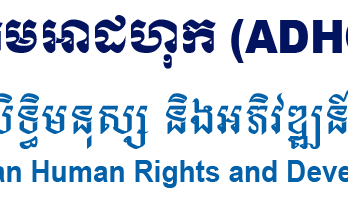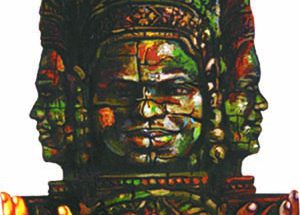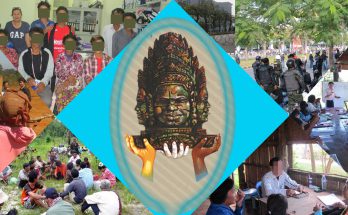6th Asian Human Rights Defenders Forum
Situation of the Human Rights Defenders in Cambodia
By Ky LATT – Head of Land Rights Section,
Cambodian Human Rights and Development Association (ADHOC)
Manila, 4th December 2014 – The Cambodian Human Rights and Development Association (ADHOC) has a unique geographical coverage in Cambodia, with offices in 24 of Cambodia’s 25 provinces and its Central Office located in Phnom Penh. Therefore it can provide statistics demonstrating the extent of land rights violations countrywide. As part of ADHOC’s mandate, ADHOC provides victims of land rights violations with information on land rights and advocacy methods. Staffs travel to target areas to conduct investigations on land rights violations and meet with affected residents and the local authorities in order to discuss the situation of land disputes and settle the disputes.
Land rights are a particularly sensitive issue in Cambodia with many stakeholders reluctant to discuss the problem for fear of reprisal. Land disputes are one of the primary development issues and sources of injustice in Cambodia, particularly in relation to ELCs and development projects.
ADHOC is gravely concerned with the increase in threats and intimidation of Human Rights Defenders (HRDs), as activists have been constantly threatened for their work relating to the protection of land, environmental and natural resources rights in Cambodia.
NEW WAVE OF CRACKDOWN ON DISSIDENTS
Since the lifting of the ban on public gatherings imposed by the Government after violent demonstration occurred during the course of 2014, Cambodia has been experienced a new wave of protests. These have intensified in the past few months, when communities affected by long-running land disputes started flocking to the capital seeking Prime Minister Hun Sen’s intervention, demanding for fair resolution and for the enactment of political reforms.
Violent clashes between the police and the protesters have followed, however Prime Minister Hun Sen’s declarations – acknowledging the problem and denouncing his underlings for failing to report and resolve land conflicts across the country – and the creation of a National Assembly’s bipartisan Human Rights Commission, tasked with the responsibility of viewing and mediating land dispute settlements, suggested that the Government was moving in the right direction.
However, the Government failed once again to keep its promises. Dissent grew stronger when no further action was taken, prompting communities to strengthen solidarity and organize protests, file complaints and petitions to the authorities on a daily basis in order to pressure the government to take responsibility and provide solutions. Of course the reasons for dissent are not limited to the failure of the government to resolve land disputes, which is just the tip of the iceberg. It comes as a reaction to the government’s attempt to close political and democratic space, putting at a stake the progresses made until now towards a multi-party democracy.
Since the beginning of 2014, the government has charged and arrested 200 activists: 109 people in connection with land rights disputes (of which 23 were held in prison and 11 have yet to be released) 62 workers or unionists (of which 41 were jailed, although as of now all released), 26 political opponents (of which 11 were imprisoned, 4 remain in prison), and 3 Buddhist monks (the three of them are still in prison).
The November wave of crackdown on protesters and arrests targeting community leaders and members of the opposition comes as a confirmation of the lack of political will and, as put by HRW, “makes a mockery of promises of democratic reform”. It also confirms the lack of transparency and independency of the courts, which are being constantly used to judicially harass human rights defenders and activists.
On November 10, 2014, seven women from the Boeung Kak Lake community were arrested after the group had tried to block the road to City Hall, placing a bed frame in the middle of Monivong Boulevard. The protesters were asking authorities to solve drainage problems leading to heavy flooding in their neighborhood during the rainy season, which they blame on the filling-in of the former Boeung Kak lake by Shukaku Company. The seven arrested, namely Tep Vanny, Song Sreyleap, Kong Chanta, Phan Chunreth, Nget Khun, Po Churvy, were held overnight at traffic police headquarters and charged with obstructing public traffic under Article 78 of the Traffic Law and insulting public officials under Article 502 of the Penal Code.
In a summary trial on November 11, all seven were sentenced to one year in prison along with the payment of a two million riel (approximately US$500) each.
Three more women activists, Heng Pich, Im Srey Touch and Phuong Sopheap, and a monk, Soeung Hai, were also arrested while peacefully protesting in front of the court to call for the release of the seven. They were tried on November 12 and sentenced to one year in jail and the payment of a fine of two million riel for obstructing a public official with aggravating circumstances under Article 504 of the Penal Code.
On November 11, the authorities also arrested Meach Sovannara, head of the CNRP’s Information Department, accused of ‘insurrection’ after joining a protest calling for reopening Freedom Park on July 15. On November 13, another CNRP activist, Tep Narin, was arrested under the same charges. Two other CNRP members have been in prison since last month.
On November 12 the authorities arrested two monks – Thach Sang and Khit Vannak – for allegedly transporting bamboo poles with flags attached to Samakki Raingsey pagoda, where they were due to join villagers from Preah Vihear involved in a land dispute in a march to Prime Minister Hun Sen’s house. They were charged with participation in a group or a conspiracy formed to commit one or more felonies.
This new wave of politically motivated arrests shows that the Government is once again aggressively denying the right to peaceful assembly by violently breaking up peaceful protests and by using criminal charges to suppress peaceful dissent.
The arrests could be part of a wider crackdown to “take the sting out” of any protests before Human Rights Day or, as suggested by HRW, come “amid a campaign by the ruling Cambodian People’s Party (CPP) of Prime Minister Hun Sen to pressure the main opposition party to scale back demands for reforms to Cambodia’s fundamentally flawed electoral system”. Whatever the case, the crackdowns have been characterized by a range of human rights violations in contravention of Cambodian and International Law.
Article 41 of the Cambodian Constitution stipulates that “Khmer citizens shall have freedom of expression, press, publication and assembly” while Article 35 provides for the right to participate actively in the economic, political, social and cultural life of the nation.
International instruments such as the UDHR and the ICCPR, directly applicable in Cambodia as prescribed by Article 31 of the Constitution, also guarantee the right of peaceful assembly. In particular, Article 21 of the ICCPR states that any restriction placed on such freedom shall be prohibited, unless it is provided by law, subjected to a strict test of necessity in a democratic society, and imposed only in the interest of national security or public safety, public order, the protection of health and public morals, or of the rights and freedoms of other.
The right of peaceful assembly is one of the fundamental freedoms legally guaranteed under domestic and international human rights. As such, authorities should immediately release and drop charges against the activists arrested during the past few weeks who were peacefully exercising their rights and should never have been prosecuted in the first place.
SECURITY ISSUES:
- Community activities on Land Rights issues
- Community leaders and representative in remote areas are easily threatened by authority and the rich and powerful;
- HRDs working to protect poorer Cambodian against rights abuses have repeatedly found themselves threatened and intimidated by the authorities, often at the request of rich and well-connected business figures.
- NGOs workers, including ADHOC staff member are currently under investigation in an act of intimidation by local and provincial authorities.
- Those threatened have not had any protection offered from authorities. Rather, threats and intimidation have come from officials, including local, provincial and judicial authorities. This is in violation of Cambodia’s international obligations, including Article 2 of the Universal Declaration of Human Rights (UDHR) and the Declaration on Human Rights Defenders. HRDs and activist are also protected under domestic law, especially under Article 231-4 of the Penal Code.
- Furthermore, the right to peacefully protest is protected by the Cambodian Constitution and International Conventions to which Cambodia is a state party. HRDs exercising the right to peaceful protest are constantly charged with spurious accusation, such as destruction of private property, incitement, disinformation, defamation, and use of violence.
CHALLENGES:
- Lack of good relations between HRDs, the government and the companies
- Lack of accurate information about development perspectives and companies leading to negative impact on the resolution of land disputes.
- Lack of accountability of authorities for preventing and resolving land disputes including the district and provincial Cadastral Commission, responsible for unregistered land and the National Authorities Land Dispute Resolution;
- Land of independency and impartiality of the Domestic Court; main concerns are the political interference into most cases handled by the courts and the limited capacity of judges, prosecutors and judicial police officers;
- Lack of willingness by the government to properly implementation the laws and policies in relation to land management.
ACTION AND PROPOSALS FOR HRD PROTECTION IN GENERAL:
- ADHOC urges the Royal Government of Cambodia to respect human rights in the country and cooperate with HRDs and activists in their work to promote and protect these rights as recognized under national and international law.
- Need emotional support to the detainees by Special Reporter of HRDs to visit the Cambodia
Further more information in related to the Land Rights in Cambodia, please see in the brief background in below:
BRIEF BACKGROUNF OF THE LAND RIGHTS IN CAMBODIA:
Land disputes are one of the primary development issues and sources of injustice in Cambodia, particularly in relation to ELCs, gender, the impact of infrastructure projects and ethnic minorities. The following is a brief history and overview of land issues in Cambodia.
Following the devastation of the Khmer Rouge, the following occupation of Cambodia by Vietnam until 1989 used a land titling system called Krom Samaki, involving communal land for group production. The abrupt cessation of this communal system in 1989 is cited as a root cause for subsequent land conflict, as it resulted in a lack of clarity about ownership[1]. From 1992, a dual system of formal and customary land titling was established, which although providing flexibility, also proved a disadvantage for women, ethnic minorities and broader marginalised groups, particularly in areas of high resource value. Customary law also prevented women from owning land, often leaving men as the sole land titleholder and with the power to make decisions related to land[2]. These different systems wrecked havoc for land tenure security throughout Cambodia, which foreshadowed the introduction of a new, more robust land titling system in 2001.
The 2001 Land Law was created to support a clearer and more formalised process for land management, including provisions for fair land distribution, improving land security and reducing land grabbing[3]. Land titling was established through systematic and sporadic processing. Systematic processing was done predominantly through the Land Management and Administration Project, where the Government acted to provide titles throughout the country – this has been the primary process. Sporadic processing allowed for individuals to approach relevant authorities to gain formal land title. Generally, the provision of land titles was based on historical occupancy of land, receipts and other indicators of land ownership. The 2001 Land Law was hailed by experts as a progressive and appropriate system to reform land management in an equitable fashion[4], particularly the inclusion of Social Land Concessions (SLCs) to provide land for communities in need. However, the evolution of land management and titling in Cambodia continues to face persistent problems, exacerbating vulnerabilities for many marginalised groups – Boeung Kak, Train Line, ethnic minorities, and dam-affected communities are just some examples of the worst affected or potentially affected, with no or inadequate compensation, highly limited involvement in decision-making processes and many other issues.
Key causes of land disputes and negative impacts for communities throughout Cambodia lies in a lack of Government transparency, high levels of corruption and ineffective avenues for dispute resolution. ELCs are some of the most contentious examples, where communities are often evicted to make way for businesses, while the whole process lacks transparency, from Phnom Penh to Kratie to further afield. These issues are exacerbated by pressure from private enterprise, conflicts of interest, and international complicity in relation to land issues, such as the foreign Government funding the train line rehabilitation. The resulting impacts for affected communities are displacement, little or no compensation for relocation (and resulting impacts of poverty), potential violent conflict, distrust of Government authorities and loss of livelihood opportunities, amongst many other impacts both for communities and the environment, such as land degradation, loss of biodiversity and devastation of river resources. Despite seemingly positive intentions, SLCs have also proven problematic, as they are often granted on land already occupied by communities, thus leading to land disputes.
The context of the Land Program is one of intense nation-wide contestation over land issues, involving community resistance (and often inability to effectively negotiate) and Government/business intimidation, matched with high sensitivity and volatility surrounding land issues. From the community perspective, they are often ill-equipped to deal with land grabs, as community organisation may be limited, land titles non-existent and ability to negotiate very limited. This leaves many communities vulnerable to exploitation, while other more-prepared communities face strong opposition and generally limited pathways to fair dispute resolution. For Government and private enterprise, the situation is reversed, where dissent is squashed, decisions made unilaterally, transparency lacking and avenues for dispute resolution ignored or blocked. Certain Government figures and private enterprise benefit handsomely from this arrangement, both in terms of power and money. Thus, they are keen to maintain the status quo. This makes for a volatile situation before NGOs are even involved.
International and national NGOs working on land issues have faced distinct ongoing challenges and opposition from Government. Global Witness’ Cambodia’s Family Trees report, Bridges Across Borders’ Derailed report and numerous ADHOC reports, such as the recent Land Situation in Cambodia 2013 report are just some examples that have brought controversy and opposition from Government. INGOs are pressured to remain quiet on issues with the threat of expulsion from the country, while national NGOs play an essential role in challenging the status quo, but without the protection of larger INGOs. ADHOC is one of the leading NGOs in Cambodia, playing a vital role promoting the advancement of human rights in Cambodia, but is often in a precarious and volatile position. ADHOC’s land program is complementary to other advocacy efforts, such as the aforementioned reports, as it supports communities directly by addressing the causes of injustices related to land disputes at the community level. Despite the intensification of land disputes in recent years, there has been a gradual shift in recent years, captured in ADHOC’s 2012 report A Turning Point. The report highlights 2,657,470 hectares of ELCs have been granted, including a 16.7% increase from 2011 to 2012[5], but the ‘turning point’ refers to the Prime Minister’s 2012 decision to place a moratorium on ELCs and speed up land titling through Directive 001. Although immense issues remain as of late 2014, ADHOC’s years of advocacy and work on land issues can be seen to be gradually gaining traction, as it seeks to create a more equitable land situation in Cambodia.



